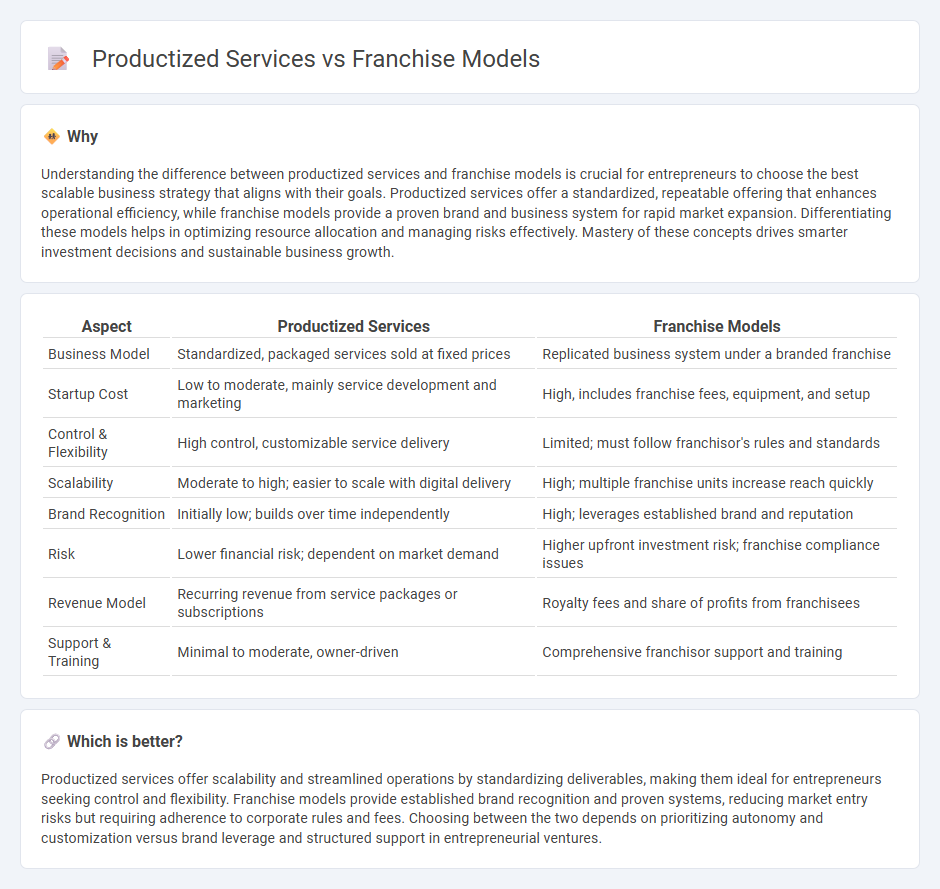
Productized services streamline specific offerings into standardized, scalable solutions ideal for entrepreneurs seeking predictable revenue and operational efficiency. Franchise models enable expansion through replicating an established brand and business system, providing extensive support and brand recognition but often requiring higher initial investment and adherence to franchise regulations. Explore the differences to determine which entrepreneurial pathway aligns best with your growth goals.
Why it is important
Understanding the difference between productized services and franchise models is crucial for entrepreneurs to choose the best scalable business strategy that aligns with their goals. Productized services offer a standardized, repeatable offering that enhances operational efficiency, while franchise models provide a proven brand and business system for rapid market expansion. Differentiating these models helps in optimizing resource allocation and managing risks effectively. Mastery of these concepts drives smarter investment decisions and sustainable business growth.
Comparison Table
| Aspect | Productized Services | Franchise Models |
|---|---|---|
| Business Model | Standardized, packaged services sold at fixed prices | Replicated business system under a branded franchise |
| Startup Cost | Low to moderate, mainly service development and marketing | High, includes franchise fees, equipment, and setup |
| Control & Flexibility | High control, customizable service delivery | Limited; must follow franchisor's rules and standards |
| Scalability | Moderate to high; easier to scale with digital delivery | High; multiple franchise units increase reach quickly |
| Brand Recognition | Initially low; builds over time independently | High; leverages established brand and reputation |
| Risk | Lower financial risk; dependent on market demand | Higher upfront investment risk; franchise compliance issues |
| Revenue Model | Recurring revenue from service packages or subscriptions | Royalty fees and share of profits from franchisees |
| Support & Training | Minimal to moderate, owner-driven | Comprehensive franchisor support and training |
Which is better?
Productized services offer scalability and streamlined operations by standardizing deliverables, making them ideal for entrepreneurs seeking control and flexibility. Franchise models provide established brand recognition and proven systems, reducing market entry risks but requiring adherence to corporate rules and fees. Choosing between the two depends on prioritizing autonomy and customization versus brand leverage and structured support in entrepreneurial ventures.
Connection
Productized services streamline entrepreneurship by offering clearly defined, scalable service packages that enhance operational efficiency and customer satisfaction. Franchise models leverage these standardized services to replicate successful business operations across multiple locations, ensuring consistency and brand reliability. The connection lies in the mutual focus on systematization, which reduces complexity and accelerates growth in entrepreneurial ventures.
Key Terms
Licensing
Franchise models typically involve comprehensive brand control, operational guidelines, and ongoing support, whereas productized services often emphasize standardized, scalable offerings without deep operational involvement. Licensing within franchises grants rights to use brand assets and business methods under specified conditions, ensuring consistency and brand integrity. Explore the advantages and applications of licensing in franchise models to understand how it can drive growth and protect intellectual property.
Standardization
Franchise models emphasize rigorous standardization across all locations to ensure consistent customer experience, branding, and operational procedures, which helps maintain quality control and scalability. Productized services focus on packaging customizable, repeatable service offerings with standardized processes to deliver efficiency and predictable outcomes. Explore the detailed differences in standardization strategies between franchise models and productized services to optimize your business approach.
Revenue Streams
Franchise models generate revenue streams primarily through initial franchise fees, ongoing royalty payments, and marketing contributions, creating predictable, scalable income based on brand replication. Productized services focus revenue on standardized service packages sold at fixed prices, optimizing cash flow through repeatable, efficiently deliverable offerings without the complexity of franchising. Explore in-depth comparisons to determine which model best aligns with your revenue goals and business scalability.
Source and External Links
Types of Franchise Models Explained - HigherVisibility - Franchise models include conversion franchises where existing businesses join a franchise network adopting brand standards, master franchises where franchisees sub-franchise in territories, and investment franchises where investors fund units but do not manage daily operations.
Franchising Business Models Explained - Hubler - Common franchise models include Company Owned Franchise Operated (COFO), where the company invests and the franchisee operates the outlet, and Franchise Owned Franchise Operated (FOFO), where franchisees own and manage their units within franchisor guidelines, the latter being the most popular.
Compare and Understand the Best Franchise Business Models for ... - Business format franchises require franchisees to follow a comprehensive system covering brand, marketing, and operations closely, while manufacturing franchises allow franchisees to produce franchisor products with some control over quality and territory.
 dowidth.com
dowidth.com